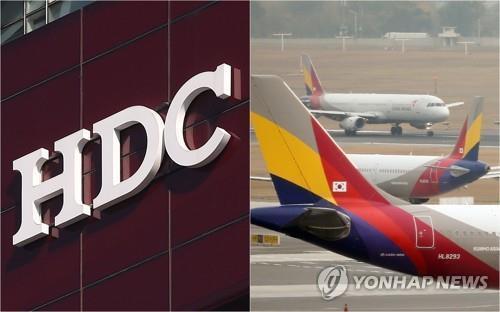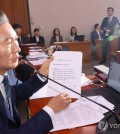- California Assembly OKs highest minimum wage in nation
- S. Korea unveils first graphic cigarette warnings
- US joins with South Korea, Japan in bid to deter North Korea
- LPGA golfer Chun In-gee finally back in action
- S. Korea won’t be top seed in final World Cup qualification round
- US men’s soccer misses 2nd straight Olympics
- US back on track in qualifying with 4-0 win over Guatemala
- High-intensity workout injuries spawn cottage industry
- CDC expands range of Zika mosquitoes into parts of Northeast
- Who knew? ‘The Walking Dead’ is helping families connect
Creditors warn of Asiana deal collapse, urge HDC to show sincerity on takeover
South Korea’s state-run Korea Development Bank (KDB) on Monday warned that property developer Hyundai Development Co. (HDC) should proceed with the proposed 2.5 trillion-won (US$2.1 billion) deal to buy Asiana Airlines Co., rejecting HDC’s request for another round of due diligence on the country’s No. 2 air carrier.
“We cannot accept the demand for a new round of due diligence,” KDB Vice President Choi Dae-hyun said in an online briefing, calling the HDC’s demand an excessive one that goes way beyond ordinary procedures in a merger and acquisition deal.
In December, the HDC-Mirae Asset Daewoo consortium signed the deal to acquire the carrier from Kumho Industrial, a construction unit of Kumho Asiana Group, as well as new Asiana shares to be issued and Asiana’s six affiliates, for 2.5 trillion won.
HDC, a major property developer, has completed seven weeks of due diligence on Asiana Airlines.
But the property developer has recently demanded additional due diligence on the debt-laden carrier for 12 weeks beginning in mid-August, claiming it will be forced to shoulder Asiana’s heavy debts if it acquires the airline without looking into its current financial conditions hit hard by the coronavirus pandemic.
Choi said the collapse of the deal will be inevitable unless HDC takes a step that would show its sincerity for an Asiana takeover, noting the HDC’s request may be aimed at delaying the deal’s close.

HDC’s company logo and Asiana Airlines’ planes at an airport in South Korea (Yonhap)
Asiana has suspended most of its flights on international routes, as more than 180 countries have strengthened entry restrictions amid virus fears this year.
Asiana’s net losses for the January-March quarter deepened to 683 billion won from 89.18 billion won a year earlier. It is widely expected to report widened losses for the second quarter.
KDB Chairman Lee Dong-gull pressed HDC to make a determination on whether it will proceed with the deal or not as he warned that HDC will be to blame for a looming collapse of the deal.
“I expect that HDC will not file a suit seeking refund of advanced payment,” Lee said, noting that KDB and Kumho Industrial have done nothing wrong.
The KDB, Asiana’s main creditor bank, and the Export-Import Bank of Korea plan to inject a combined 1.7 trillion won into Asiana to help the carrier stay afloat. Last year, the creditors extended a total of 1.6 trillion won to the carrier.
In its self-help measures, Asiana has had all of its 10,500 employees take unpaid leave for 15 days a month since April until business circumstances normalize. Asiana’s executives have also agreed to forgo 60 percent of their wages, though no specific time frame was given for how long the pay cuts will remain in effect.
Separately, the KDB said it is ready to inject some of the 40 trillion-won fund for backbone industries into Korean Air Lines Co., noting the carrier plans to apply for financial support.
Choi said Asiana could also receive financial support.
Consultations have been under way between the government and financial companies over additional financial support to budget airlines, according to the KDB.
South Korea’s two full-service carriers — Korean Air Lines and Asiana Airlines — and seven low-cost carriers have suffered from a sharp decline in air travel demand sparked by the coronavirus pandemic.
The KDB and the Export-Import Bank of Korea have so far injected a combined 300 billion won into Jeju Air, Jin Air, T’way, Air Busan and Air Seoul — five out of seven low-cost carriers.











